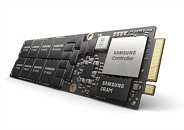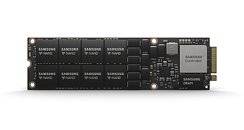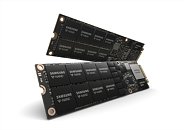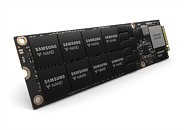Thursday, June 21st 2018

Samsung Introduces 8 TB NVMe SSD For Data Centers
Samsung Electronics, the world leader in advanced memory technology, today announced that it has launched the industry's highest capacity NVMe solid state drive (SSD) based on the incredibly small Next-generation Small Form Factor (NGSFF) - an eight-terabyte (TB) NF1 SSD. The new 8TB NVMe NF1 SSD has been optimized for data-intensive analytics and virtualization applications in next-generation data centers and enterprise server systems.
"By introducing the first NF1 NVMe SSD, Samsung is taking the investment efficiency in data centers to new heights," said Sewon Chun, senior vice president of Memory Marketing at Samsung Electronics. "We will continue to lead the trend toward enabling ultra-high density data centers and enterprise systems by delivering storage solutions with unparalleled performance and density levels."The new SSD is built with 16 of Samsung's 512-gigabyte (GB) NAND packages, each stacked in 16 layers of 256 gigabit (Gb) 3-bit V-NAND chips, achieving an 8TB density in an ultra-small footprint of 11 cm x 3.05 cm. This is twice the capacity offered by the M.2 NVMe SSD (11 cm x 2.2 cm) commonly used in hyper-scale server designs and ultra-slim laptops. The NF1 SSD is expected to quickly and easily replace conventional 2.5-inch NVMe SSDs by enabling up to three times the system density in existing server infrastructure, allowing for an unprecedented 576TB of storage space in the latest 2U rack servers.
The NF1 SSD features a brand new, high-performance controller that supports the NVMe 1.3 protocol and PCIe 4.0 interface, delivering sequential read speeds of 3,100 megabytes per second (MB/s) and write speeds of 2,000MB/s. These speeds are more than five times and three times that of a typical SATA SSD, respectively. Random speeds come in at 500,000 IOPS for read operations and 50,000 IOPS for writes. Utilizing the new NF1 storage solution, an enterprise server system can perform over one million IOPS in a 2U rack space, significantly enhancing the return on investment for next-generation large-scale data centers. The SSD also includes a 12GB LPDDR4 DRAM to enable faster and more energy-efficient data processing.
To ensure long-term data reliability, the NF1 NVMe SSD has been designed with an endurance level of 1.3 drive write per day (DWPD), which guarantees writing an entire 8TB of data 1.3 times a day over its three-year warranty period.
Samsung plans to accompany its 256 Gb 3-bit V-NAND-based SSD with a 512Gb version in the second half of this year to accommodate even faster processing for big data applications, while also accelerating the growth in next-generation enterprise and mid-market data centers.
"By introducing the first NF1 NVMe SSD, Samsung is taking the investment efficiency in data centers to new heights," said Sewon Chun, senior vice president of Memory Marketing at Samsung Electronics. "We will continue to lead the trend toward enabling ultra-high density data centers and enterprise systems by delivering storage solutions with unparalleled performance and density levels."The new SSD is built with 16 of Samsung's 512-gigabyte (GB) NAND packages, each stacked in 16 layers of 256 gigabit (Gb) 3-bit V-NAND chips, achieving an 8TB density in an ultra-small footprint of 11 cm x 3.05 cm. This is twice the capacity offered by the M.2 NVMe SSD (11 cm x 2.2 cm) commonly used in hyper-scale server designs and ultra-slim laptops. The NF1 SSD is expected to quickly and easily replace conventional 2.5-inch NVMe SSDs by enabling up to three times the system density in existing server infrastructure, allowing for an unprecedented 576TB of storage space in the latest 2U rack servers.
The NF1 SSD features a brand new, high-performance controller that supports the NVMe 1.3 protocol and PCIe 4.0 interface, delivering sequential read speeds of 3,100 megabytes per second (MB/s) and write speeds of 2,000MB/s. These speeds are more than five times and three times that of a typical SATA SSD, respectively. Random speeds come in at 500,000 IOPS for read operations and 50,000 IOPS for writes. Utilizing the new NF1 storage solution, an enterprise server system can perform over one million IOPS in a 2U rack space, significantly enhancing the return on investment for next-generation large-scale data centers. The SSD also includes a 12GB LPDDR4 DRAM to enable faster and more energy-efficient data processing.
To ensure long-term data reliability, the NF1 NVMe SSD has been designed with an endurance level of 1.3 drive write per day (DWPD), which guarantees writing an entire 8TB of data 1.3 times a day over its three-year warranty period.
Samsung plans to accompany its 256 Gb 3-bit V-NAND-based SSD with a 512Gb version in the second half of this year to accommodate even faster processing for big data applications, while also accelerating the growth in next-generation enterprise and mid-market data centers.




8 Comments on Samsung Introduces 8 TB NVMe SSD For Data Centers
www.span.com/product/Intel-SSD-DC-P4510-SSDPE2KX080T801-2-5-U-2-NVMe-8TB-SSD~64086
This drive is pure sex.
Example server:
They don't connect directly to the motherboard like an M.2 drive, but rather to a back plane, much as regular SATA/SAS drives do in a server.